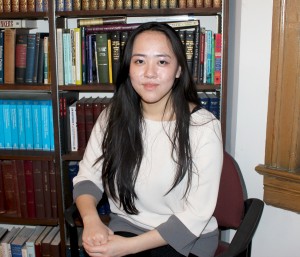Meet the New AHA Staff Member: Jessica Xiao, Project Assistant

Please welcome the newest addition to the American Humanist Association staff, Project Assistant Jessica Xiao! Learn more about her background and support for humanism below.
TheHumanist.com: What is your educational and work background?
I was born in Pennsylvania and grew up in New Jersey, where I got my first taste of government bureaucracy as an intern for my high school district’s superintendent.
I later moved to the charming but wintry city of Montreal to study economics and psychology at McGill University. It was there that I developed an understanding of consumer behavior within the larger framework of economic systems.
I also had the serendipitous opportunity to volunteer for Artistri Sud, a nonprofit that aims to empower women all over the world through entrepreneurship training. Through this work, I developed relationships with mentors whose vital guidance led me to (1) realize that I can find (or create) meaningful work where I don’t have to compromise my values, and (2) that the most wonderful thing about a career in social impact (and about life) is the uncertainty and open-endedness of the route. Hence, I started to interpret my chosen fields of study at McGill as an exploration of the qualitative impact of soft skills from the individual level to the systems level.
I next interned at the Social Economy Initiative at McGill, studying social return on investment (SROI), social entrepreneurship, and impact investing. This was followed by work for the Social Equity and Diversity Education Office at McGill coordinating The Hidden Gems Project to encourage intergenerational learning between McGill student volunteers and elderly residents of Montreal through volunteer production of radio play narratives.
TheHumanist.com: How did you first learn about humanism?
I was a humanist before I knew to describe myself as such. When I was young, I was convinced that one drop of water caused ripples that traverse the whole ocean (I also thought I was a clever eleven-year-old for thinking this). As I grew, I thought that this ripple, the panacea for human society, must be education and educational equity—to embolden people to use better judgment in deciding which beliefs based on current knowledge best correspond with reality, and to be able to change those beliefs when they are no longer the best representation of reality. Today, I believe that this theory of human improvement requires two additional pillars: respect for one another and empathy.
I didn’t know that my optimism for human progress based within each individual’s capacity for personal empowerment and development of moral integrity sans supernaturalism was humanism until I encountered the AHA job opportunity on Idealist.org. And how could I not fall in love with such a sublime way of putting it?
TheHumanist.com: Did you grow up in religion? What was it like?
I did not grow up in a religious home. My father identifies as a Christian, though his version of God appears to be a result of his difficulty in imagining that such a complex universe did not have a creator. My mother disclosed once that she believes in “God,” though she seems more superstitiously agnostic than theistic. Neither of my parents brought up religion on a normal basis to my sisters or me, though when a friend in high school invited me to her church my dad encouraged me to attend, seeming pleased at the idea. (Incidentally, I did go—mostly to try and meet cute boys.)
However, my parents did emphasize the importance of hard work and education. I remember my dad driving me to the SAT exam. As a sheep of pop-science, I’d eaten an egg for breakfast for protein and slow-carb energy, bringing a piece of dark chocolate for the break to supposedly improve cognitive function, and I took an aspirin in the morning to physiologically increase blood flow to my brain. Imagine my indignation when my dad had the gall to remark, “When I was young, my friends and I would pray to God before a big exam. You pray after you’ve already done the studying and there’s nothing else you can do.”
TheHumanist.com: What interested you most about working for the American Humanist Association?
My main drive was the opportunity to become involved in a more substantive way in the movement to broadcast and encourage humanism, and I’m thrilled with the thought of sharing my voice with an engaged readership through AHA publications. I was also indulging and succumbing to my wanderlust… I look forward to exploring a new city.
TheHumanist.com: Have you read any good books lately? What’s your favorite book?
I encourage all aspiring world-changers to read Half the Sky by Nicholas Kristof and Sheryl Wu Dunn, The Power of Unreasonable People by John Elkington and Pamela Hartigan, The Plundered Planet by Paul Collier, Blessed Unrest by Paul Hawken, and Flow: the Psychology of Optimal Experience by Mihaly Csikszentmihalyi.
Dorothy Parker, Anais Nin, Milan Kundera, and Haruki Murakami can do no wrong in my mind, writing-wise. For all other books dear to my heart, please give me an excuse to update my Goodreads page!
TheHumanist.com: If you could have dinner with any three people (living or dead), who would they be and why?
I will always choose my turning-point mentor Anita Nowak, an inspirational educator with a huge heart who cultivates spaces for co-creation of social impact through empathic action. I wish I could keep her on my shoulder as a personal guiding voice. Generally I’m a big fan of people who value pedagogy and invest in our next generation.
Jon Stewart is pretty awesome too.
But I think it would be fabulous if I could host a dinner banquet instead and invite Charles Darwin plus a representative from each transitional species leading to modern humans.
